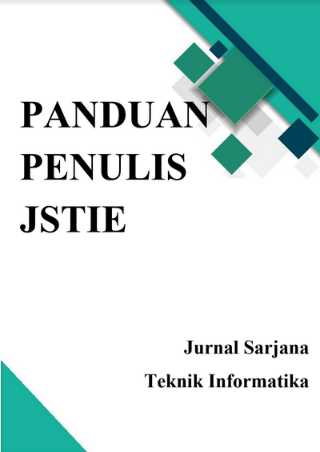APLIKASI PENGETAHUAN DASAR HIV dan AIDS BERBASIS ANDROID
DOI:
https://doi.org/10.12928/jstie.v2i2.2723Abstract
Kurangnya pengetahuan masyarakat tentang HIV dan AIDS dengan cara penularannya menjadi salah satu faktor pendukung sikap masyarakat terhadap orang dengan HIV dan AIDS (ODHA). Sebagai langkah awal untuk memperbaiki stigmatisasi dan diskriminasi terhadap ODHA dalam upaya penanggulangan HIV dan AIDS. Media pengetahuan berbasis android dapat digunakan untuk meningkatkan pengetahuan masyarakat tentang HIV dan AIDS, serta meningkatkan kesadaran dan mempromosikan perubahan perilaku yang berkelanjutan untuk mengurangi kerentanan terhadap virus . Salah satu peran yang paling jelas dari media adalah membuka saluran komunikasi dan diskusi tentang HIV dan AIDS.
Android ini dipilih karena platform tersebut berkembang dengan sangat cepat karena bersifat open source sehingga mudah dipelajari oleh siapa saja. Smartphone dengan sistem operasi Android pun tersedia dalam berbagai bentuk, ukuran, spesifikasi, merk, dan harga sehingga pembeli dapat memilih sesuai dengan kebutuhan mereka, serta aplikasi-aplikasi tersedia secara luas dan mayoritas tidak berbayar.
Dari pengujian yang dilakukan dihasilkan  Sistem Basis Pengetahuan Untuk kerusakan mesin pada sepeda motor supra125 untuk mendiagnosa kerusakan yang dapat bekerja seperti layaknya seorang pakar, dimana yang dihasilkan mampu mendiagnosa 10 kerusakan, 25 Gejala, 10 penyebab dan 10 solusi.
Â
Kata Kunci : aplikasi, pengetahuan dasar HIV dan AIDS, android.
References
Jogyanto, 2005, Analisis & Disain Sistem Informasi Pendekatan Terstruktur Teori dan Praktek Aplikasi Bisnis, Andi Offset, Yogyakarta.
Fathasyah, 1999, Basis Data, Informatika, Bandung.
Praja,Yayasan,Kerti, 2006, Modul Pelatihan Petugas Penjangkau Dalam Penanggulangan IMS dan HIV/AIDS, Denpasar.
Ericks, Eduardus , 2010. Reversee Engineering Aplikasi Dekstop ke Android Mobile Dengan Studi Kasus Media Pembelajaran (Skripsi S-1). Yogyakarta : Universitas Ahmad Dahlan.
Arbi, Haibi, 2010, Aplikasi Bantu Pembelajaran Online dengan Perangkat Mobile, Universitas Ahmad Dahlan, Yogyakarta.
Prasetyo, D.D, 2003, Administrasi Database Server MySQL, Elex Media Komputindo, Jakarta.
Pendidikan, Departemen, Nasional, 2004, Strategi Pennvegahan HIV/AIDS melalui Pendidikan, Jakarta.
Spiritia, Yayasan, 2005, Hidup Dengan HIV/AIDS, Jakarta.
UNAIDS, Media and HIV/AIDS making a difference, Global Media Aids Initiative, Switzerland
Notoatmodjo, (2005) Promosi Kesehatan: Teori & Aplikasi, Rineka Cipta, Jakarta
Downloads
Published
Issue
Section
License
License and Copyright Agreement
In submitting the manuscript to the journal, the authors certify that:
- They are authorized by their co-authors to enter into these arrangements.
- The work described has not been formally published before, except in the form of an abstract or as part of a published lecture, review, thesis, or overlay journal. Please also carefully read Journal Posting Your Article Policy.
- The work is not under consideration for publication elsewhere.
- The work has been approved by all the author(s) and by the responsible authorities – tacitly or explicitly – of the institutes where the work has been carried out.
- They secure the right to reproduce any material that has already been published or copyrighted elsewhere.
- They agree to the following license and copyright agreement.
Copyright
Authors who publish with Jurnal Sarjana Teknik Informatika agree to the following terms:
- Authors retain copyright and grant the journal right of first publication with the work simultaneously licensed under a Creative Commons Attribution License (CC BY-SA 4.0) that allows others to share the work with an acknowledgement of the work's authorship and initial publication in this journal.
- Authors are able to enter into separate, additional contractual arrangements for the non-exclusive distribution of the journal's published version of the work (e.g., post it to an institutional repository or publish it in a book), with an acknowledgement of its initial publication in this journal.
- Authors are permitted and encouraged to post their work online (e.g., in institutional repositories or on their website) prior to and during the submission process, as it can lead to productive exchanges, as well as earlier and greater citation of published work.







